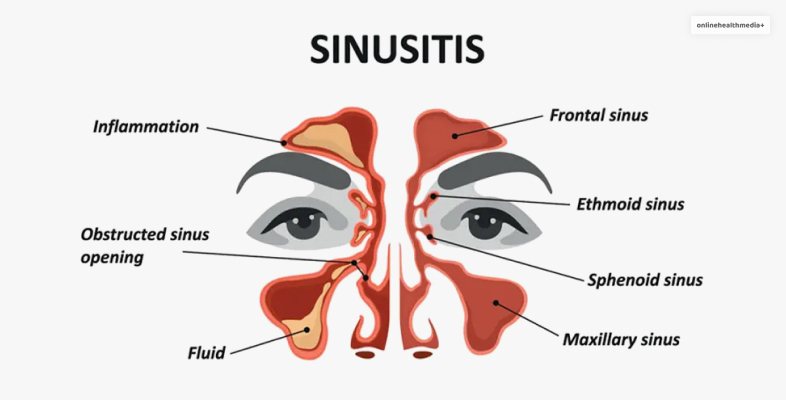Is Sinus Infections Contagious? – Here Is All The Information You Need
Many of us suffer from different health conditions. Sinusitis is one of them. It has been seen that sinusitis, or the tendency to get a sinus infection, is pretty common. Let’s find out Is sinus infection contagious?
Well, I can’t deny the fact because I, along with my 2 best friends, have had this health condition since middle school. Life is not that easy for us at all. During those teen days, home remedies and over-the-counter medications were our only hope.
But medical science has developed a lot in the last few years. And that is why a lot of sinusitis patients like me get to breathe freely.
But, while socializing, many of us have a question, “Is sinus infection contagious?” because we know the pain and suffering and do not want anyone else to experience it. Here, in this article, I will give you the answer to this question.
But before, let’s have a general idea about sinus infection or sinusitis.
What Is A Sinus Infection?

When fluid builds up in the nasal cavities that lead to sinus pain, inflammation along with other frustrating symptoms, it is addressed as a sinus infection. Here are the symptoms of sinus infection.
- Fatigue.
- Fever.
- Cough.
- Bad breath.
- Sore or irritated throat.
- Postnasal drip.
- Yellow, cloudy, or green, thick nasal discharge.
- Loss of smell.
- Stuffy or runny nose.
- Headache.
- Pressure or pain in the sinuses, between eyes, on the forehead, at the upper jaw, or on the sides of the nose.
It is true that most sinus infections are similar, but the cause of the underlying issue is not the same all the time.
Read More: Is Laryngitis Contagious? | Causes, Types, And Symptoms!
Transmission: How Contagious Is A Sinus Infection?

When music or fluid is trapped in the sinuses, harmful germs might start to grow. This might lead to a sinus infection. Here are the most common causes of sinus infections.
- Allergies.
- Nasal polyps are growths in the nose.
- Fungi.
- Bacteria.
- Viruses, like cold and flu virus.
- Nasal tumors.
- Deviated septum is when the wall between the nasal passages is off-center or crooked.
I have discussed the major reasons for sinusitis infection in the section below.
Symptoms Of Sinusitis

Here are the major symptoms of sinus infection.
- Fatigue.
- Fever.
- Bad Breath.
Is Sinus Infections Contagious?

Sinus infections can make breathing really hard, and also, the pressure in the face can hurt. As a result, you might cough and also produce a lot of discharge. At that time, the comfort might make you feel as if you could transfer it to someone else.
So, the answer to your question, “Is sinus infection contagious?” is sort of because it actually depends on what caused the infection. Here is a detailed discussion on it so that you can get a better understanding of it.
Bacteria

In some cases, when the sinuses are filled with mucus and blocked, bacteria may grow and result in an infection. In case your sinus infection lasts for more than 10 to 14 days, you are more exposed to bacterial sinusitis.
The good news is that in case your infection is caused by bacteria, you can not spread it to anyone else. So, if you are thinking, “Is a bacterial sinus infection contagious?” The answer is NO.
Viruses

The virus is the main culprit behind most sinus infections. In case it is your case, then you can spread the virus which caused it but not the sinus infection itself.
That means some other person might get sick due to the same virus but might not get the sinus infection from you. In most cases, all these viruses cause colds that might or might not lead to sinus infection.
Other Causes
There are a lot of people who have chronic sinusitis, and it usually lasts for a minimum of 12 weeks. This type of infection is often caused by allergies.
A deviated septum that is a crooked wall between your nostrils or polyps, which is a tissue growth in your nose, always raises your risk. In some cases, dry air, polluted air, and tobacco smoke can also trigger sinusitis.
Here, you might not know what is actually causing your sinusitis. That is why it is always best to avoid close contact with other people, along with consulting with your doctor.
How Long Is A Sinus Infection Contagious?

In case the virus is the reason behind the sinus infection, you might have been contagious some days prior to actually getting your sinus infection. In most cases, the viruses can be spread for just a few days.
However, in some cases, you also could pass the virus on for a week or more than that.
How Is Sinusitis Spread?

When you are looking for the answer, “Is a sinus infection contagious?” you might also want to know how sinusitis usually spreads.
Just the way you get cold and flu, you also can get sinusitis: passing it from your hand to your mouth or nose after touching something or by breathing it in. After an infected or sick individual coughs or sneezes, viruses get in the air.
Also, if you shake hands with an individual who is sick or touch a doorknob or any other object that a sick individual has already touched. That is why doctors always recommend washing your hands with soap and water in order to keep from getting viruses.
In addition to all these, healthcare professionals also recommend not touching a month, nose, or eyes. It is always best to avoid people who have flu and cold or similar symptoms. In case you have sinusitis, always cover your mouth while sneezing or coughing.
And also, wash your hands properly in order to avoid making anyone sick.
Treatment OF Sinusitis

Only knowing the answer to “Is sinus infection contagious?” is not going to help you. You must know the available treatment options as well. So, let me tell you there are many treatment options available for sinus infections.
Here are things with most treatment plans starting.
- Rest.
- Mucus thinner.
- Antihistamines.
- OTC or over-the-counter fever reducers,
- OTC pain relievers.
- OTC decongestants.
- Saline nasal irrigation along with saline nasal sprays.
In case OTC and home remedies do not work, you need to consult with your doctor for other treatments. Here are the most common ones.
- Sinus surgery.
- Immunotherapy.
- Injected or oral corticosteroids.
- Nasal antihistamine sprays.
- Nasal corticosteroids and sprays.
- Antibiotics.
Always remember, in case your sinus infection is the result of bacteria, antibiotics will work. In case of a virus-caused infection, they will not be able to make any changes.
Time To Consult With A Doctor

Any type of health issue needs professional assistance. Still, in some cases, home remedies and over-the-counter treatment options work well. But if that doesn’t work, you should consult with your doctor.
In case you are experiencing any of the following, you should consult with your doctor immediately.
- A swollen forehead.
- Redness or swelling around the eyes.
- Double vision or problem seeing.
- A fever with a temperature above 102°F or 38.8°C.
- Confusion.
- A stiff neck.
- Sinus symptoms that last more than 12 weeks.
- Headaches and intense pain do not go away.
Also, in case you have more than one sinus infection in just 12 months or any of the over-the-counter medicines are not improving your symptoms, consulting with your doctor is the best thing to do.
Sometimes, it has also been seen that sinus infections lead to other complications. So talk with your doctor as soon as possible in case of the following.
- Meningitis.
- Loss of smell, which is temporary or permanent.
- Other infections, such as skin infection (cellulitis) or bone infection (osteomyelitis).
Read More: What Is ADHD? Symptoms, Treatment, And Prevention
Frequently Asked Questions (FAQs):
Here are some most commonly asked questions that I believe you also have in your mind when you are looking for the answer to “is sinus infection contagious?”
Ans: In case any virus is behind the sinus infection, it usually lasts around 7 to 10 days. That means you will be contagious with the virus for up to 2 weeks. But, in case your symptoms last more than 10 days or they keep returning, it might be a bacterial sinus infection that does not spread.
Ans: As I have mentioned in the above article, in most cases, sinus infections are brought on by viruses. In case it is your case, then you obviously can spread the particular virus that caused it; however, it is not applicable to the infection itself. The other infected person might fall sick, but they might not get a sinus infection.
Ans: Through the air, when you cough or sneeze, you can spread the virus that is responsible for sinus infection. In order to reduce the risk of spreading infection, you should cover your mouth and nose while coughing or sneezing.
Ans: As viral sinus infections mostly develop as a result of the common cold, that means it is more likely that you will spread the cold instead of a sinus infection. Bacterial and fungal sinus infections are not that contagious.
Final Talks
I believe after going through this article; you get your answer of “is sinus infection contagious?” Only the viral sinus infection is contagious. Still, you should take the necessary precautions and get the treatment, as you might not know what has caused your sinus infection.
Read Also:
- Inhibin: Definition and Overview
- What Is Asthma? Symptoms, Treatment, And Prevention
- What Is Autoimmune Disorders? Symptoms, Treatment, And Prevention



